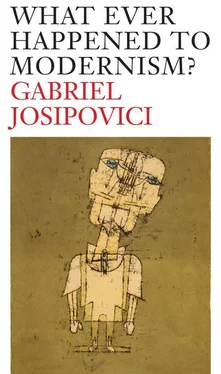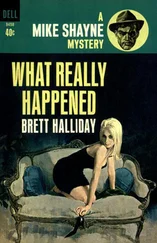But what of literature? As it happens there is a nice example to hand of how the Picasso moment of 1912 is destined to be played out again and again whenever Modernism is in question. In the 1950s a young French agronomist who had briefly been a prisoner of war in Germany and then worked on banana plantations in Africa, began to try his hand at the writing of fiction, first with short stories and then with a mysterious novel based on Oedipus Rex in which the detective detailed to investigate a murder finds that the murder has not (yet) taken place, and ends up committing it himself. Clearly what interested the young Robbe-Grillet in the Greek tragedy was its inexorable quality, the fact that there is nothing arbitrary in the plotting, that all unfolds with the relentlessness of a machine. In his subsequent novels, Le Voyeur, La Jalousie and Dans Le Labyrinthe , he found his voice and produced a series of masterpieces. As his most acute critic, Maurice Blanchot, immediately discerned, the cold, precise descriptive style Robbe-Grillet perfected had nothing to do with hyper-realism but rather was the means of articulating a nightmare vision in which the light is always at maximum brightness but its source remains mysteriously hidden, in which something has possibly taken place which the narrative not only cannot articulate but is at pains to conceal even from itself. In Le Voyeur it is the murder of a child; in La Jalousie it is an act of marital betrayal. These novels are like no others, but they do conform to the Mallarméan injunctions: they proceed by means of hypothesis and by short cuts, and the anecdote is eschewed. Because the obsessive consciousness is at the heart of each, the author is released from the need to tell a story, to move on from event to event, with the sense that this would bring with it of the thinness and insubstantiality of what is being depicted, as well as of its arbitrary nature. Instead, as in Pinget, we have the impression of a field being explored; when it has been thoroughly tilled the book ends, leaving us with a powerful sense of having undergone an intense if inarticulate experience.
The feeling of being in a labyrinth from which it is impossible to escape, already strong in Robbe-Grillet's first novel, Les Gommes , is most clearly evident in his fourth, Dans le Labyrinthe . But in this story, of a soldier seeking to deliver a parcel the contents of which he does not know in a town which is both familiar and unfamiliar, the compulsive centre from which the previous two novels had radiated is less intense — there is no crime or outrage to explain why it is the soldier wanders in his labyrinth. The story, with its rhythms of returning again and again to the same spot, hovers between the terrifying and the pleasurable, perhaps the kind of pleasure Hans Castorp in The Magic Mountain felt he would experience if he lay down in the snow and allowed himself to doze off. The rhythms of the sentences and of the movements of the soldier, for ever striving forward but getting nowhere, lull us into a kind of will-less concentration, such as those who meditate tell us they experience. It is Robbe-Grillet's most beautiful book, held in a kind of gentle tension, like some of Wallace Stevens's greatest poems, between meaning and the abandonment of meaning, mysterious, like them, and, like them, precise in every word.
But after that novel something seems to have happened to Robbe-Grillet's work. It is as if he had suddenly discovered that the free circulation of the sign, to use Rosalind Krauss's terminology, had made it possible for him to do anything he wished, and henceforth he does just that — but at the cost of leaving us indifferent to what he is doing, leaving us, in effect, just as Bacon described himself left by abstract art, bored by the lack of tension. We were certainly not indifferent to what was unfolding in Le Voyeur and La Jalousie , even if we were unclear as to just what was unfolding. We wanted to know the outcome even as we came to realise that we never would. From his fifth novel on, we can admire Robbe-Grillet's pellucid style but we cease to have any interest in his books. Unfortunately too, for Robbe-Grillet as for his fellow-novelist Claude Simon, this was just the moment when the brilliant critic Jean Ricardou began to publish his spirited defence of the nouveau roman — but a defence that was so powerful, so fool-proof precisely because it started from the premise that the free circulation of the sign meant that art had finally, thankfully, cut itself off from the world and had only itself to worry about. In a famous debate Robbe-Grillet claimed that he began from a word and let it carry him where it would, while Nathalie Sarraute, the ‘mother’ of the nouveau roman , insisted that one began with a darkness which one felt the need to penetrate. Robbe-Grillet would have none of this: Kandinsky and the Surrealists, Picabia and Pop Art had, in effect, for him, replaced Picasso. Only Pinget and Duras, the least intellectual of the group, continued to develop, producing works that were at times flawed, at times embarrassingly bad, but also at times masterpieces of the order of Passacaille or L'Amante anglaise . There is no clearer indication that in the field of literature as well as in the fine arts, Picasso's instinctive aversion to both abstraction and the mass-produced was the result of his correct intuition as to where lay the health of art and the true destiny of Modernism.
10. A Clown, Perhaps, But An Aspiring Clown
I grow old …I grow old…
I shall wear the bottoms of my trousers rolled.
Shall I part my hair behind? Do I dare to eat a peach?
I shall wear white flannel trousers, and walk upon the beach.
I have heard the mermaids singing, each to each.
I do not think that they will sing to me.
I have seen them riding seaward on the waves
Combing the white hair of the waves blown back
When the wind blows the water white and black.
We have lingered by the chambers of the sea
By sea-girls wreathed with seaweed red and brown
Till human voices wake us, and we drown.
A
t first sight the form and title of the poem — ‘The Love Song of J. Alfred Prufrock’ — suggest that it is, like one of Browning's monologues, an exercise in characterisation. But this soon turns out to be an error. Eliot's poem too insistently breaks down the boundaries between the main character, the writer and the reader: Prufrock is not a figure from the past but from the present, not someone ‘out there’ but someone uncomfortably ‘in here’, not someone with a story to tell but only someone who seems to feel the need to speak. It's true that the speaker is given a name and a comic name at that, but this is a lure, an attempt by the poet to isolate his anxieties by dramatising them, much as Hamlet ‘puts an antic disposition on’. In fact, we soon realise, the poem is really a kind of ode, like Wordsworth's Immortality Ode or Keats's ‘Ode to Melancholy’, a
poem in which the first person speaks for all of us and speaks in order not to instruct but to understand. And just as we have to take the pronouncements of Wordsworth and Keats seriously, so here, when Eliot/Prufrock says: ‘I have heard the mermaids singing each to each./ I do not think that they will sing to me’, we must take him as seriously as we would take the pronouncements of any poet. Were he prepared to roll up the bottoms of his trousers and walk upon the beach without self-consciousness all would perhaps be well. He would be a novelist, perhaps, or a minor poet, commenting on the seascape. Were the mermaids to sing to him as the Muses sang to Homer all would be well. He would write down their words and be the spokesman of the community. But no, he has heard the mermaids singing and so can never again return to his old life; but because they weren't singing to him but only to each other, he is in the unenviable position of having to live with the sense that what would give meaning to his life is there, but just out of earshot. ‘There is salvation’, as Kafka once said, ‘but not for us.’
Читать дальше












